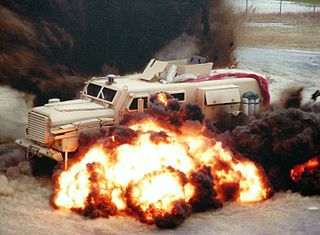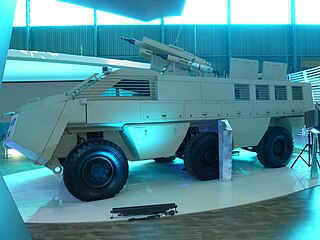
The Ratel is a South African infantry fighting vehicle. It was the first wheeled infantry fighting vehicle to enter service worldwide and was built on a modified MAN truck chassis. The Ratel was designed in response to a South African Army specification for a light armoured vehicle suited to the demands of rapid offensives, providing maximum firepower and strategic mobility to mechanised infantry units intended to operate across the vast distances of Southern Africa. Primarily envisaged in SADF doctrine as a vehicle that could deliver mechanised infantry and supporting fire to tanks in conventional warfare, it was also anticipated that the Ratel could form the centrepiece for semi-independent battlegroups where logistics or politics precluded the use of tanks. The Ratel was a simple, economical design which helped reduce the significant logistical commitment necessary to keep heavier combat vehicles operational in undeveloped regions. It was generally regarded as an influential concept which incorporated a number of novel features, such as a mine-protected hull, an extended operating range of 1,000 kilometres, and a 20 mm autocannon fitted with what was then a unique twin-linked ammunition feed, allowing turret gunners to rapidly swap between ammunition types during combat.

The Casspir is a Mine-Resistant Ambush Protected Vehicle that has been in use in South Africa since the 1980s. It is a four-wheeled, four-wheel drive vehicle, used for transport of troops. It can hold a crew of two, plus 12 additional soldiers and associated equipment. The Casspir was unique in design when launched, providing for passive mine defence. The main armoured steel body of the vehicle is raised high above the ground, so when a mine is detonated, the explosion is less likely to damage the crew compartment and kill the occupants. The cross-section of the hull is V-shaped, directing the force of the explosion outwards, further protecting the occupants.

The Buffel is an infantry mobility vehicle used by the South African Defence Force during the South African Border War. The Buffel was also used as an armoured fighting vehicle and proved itself in this role. It replaced the older Bedford RL-based Hippo APC and itself was replaced by the Mamba from 1995 in South Africa, but remains in use elsewhere, notably Sri Lanka.

The Saxon is an armoured personnel carrier formerly used by the British Army and supplied in small numbers to various overseas organisations. It was developed by GKN Sankey from earlier projects, AT 100 IS and AT104, and was due to be replaced by the Future Rapid Effect System.

The Cougar is a mine-resistant ambush-protected (MRAP) and infantry mobility vehicle structured to be resistant to landmines and improvised munitions.

The RG-33 is a mine-resistant light armored vehicle initially designed by BAE Systems Land Systems South Africa, a South African subsidiary of BAE Systems. BAE Systems in the US extensively modified it with additional protection, new powertrain, and suspension systems. It was built in a number of locations including York, Pennsylvania. It was one of several vehicles being fielded by the US Armed Forces in Iraq under the United States MRAP program.

Mine-Resistant Ambush Protected Vehicle (MRAPV), also known as MRAP Vehicle, is a type of armoured personnel carrier that are designed specifically to withstand land mines, improvised explosive device (IED) attacks and ambushes to save troops' lives. Most modern Infantry mobility vehicle also have certain level of MRAP capabilities.
The Ministry of Defence Industry of Azerbaijan is a governmental agency within the Cabinet of Azerbaijan in charge of design, manufacturing, regulation and maintenance of products in the fields of defense, radio electronics, instrument engineering.

The Maverick is an internal security vehicle that was designed and developed by the Paramount Group in South Africa.

The RG Outrider, also known by its original designation RG-32M light tactical vehicle (LTV), is a 4x4 multi-purpose mine-protected armoured personnel carrier (APC) manufactured by BAE Systems of South Africa. It was first introduced in early 2009 as the RG-32M LTV, and was first purchased by Ireland. The vehicle was offered to the US market the following year, re-designated as RG Outrider. It is based on and is the successor to the RG-32M already in service in Afghanistan with the coalition forces. The RG Outrider offers several improvements over its predecessor, including the addition of the V-shaped hull.

The Aravis is an Mine-Resistant Ambush Protected Vehicle developed and built by French company Nexter. An order for 15 Aravis vehicles was placed by the Délégation Générale pour l'Armement in April 2009 for use by the French Army as a reconnaissance and escort vehicle for engineer units. Deliveries for the initial order began in January 2010.

The Mfezi is an armoured ambulance used by the South African Military Health Service. The name Mfezi is a Zulu word that means cobra. The snake is the emblem of the South African Operational Medical Orderly who operate and use these vehicles, therefore armoured ambulances are named for snakes in South African military service.

The Mbombe 6 is a mine-protected, high-mobility armoured fighting vehicle produced by Paramount Group from South Africa that was launched in 2010. "Mbombe" is named after an African warrior.
Defence Land Systems India Limited (DLSI) was a joint venture between Mahindra & Mahindra Limited and BAE Systems. It designs and produces light armoured vehicles, specialist military vehicles, mine protected vehicles, artillery systems and other land weapons systems and vehicles. The company has production facilities in Prithla, Haryana.
The Mahindra Mine Protected Vehicle-I (MPV-I), is an Indian Mine-Resistant Ambush Protected Vehicle manufactured by Defense Land Systems, a joint-venture of Mahindra & Mahindra Limited and BAE Systems, the first vehicle made under the venture. It is an improved Casspir variant built under licence.

Ashok Leyland Defence Systems is a Hinduja Group company involved in manufacturing military trucks such as the widely used Stallion troop carriers.

The Marauder is an armoured, mine-protected vehicle that is produced by Paramount Group in South Africa. It was launched during the 2007 International Defence Exhibition (IDEX) and Conference in Abu Dhabi, the largest arms exhibition in the Middle East.

Paramount Group is a Global Aerospace & Defence group of companies operating in the global defence, internal security and peacekeeping industries. Established in South Africa in 1994, it offers a range of military aircraft, armoured vehicles, maritime systems, equipment and training to governments.

The Aditya Mine Protected Vehicle is a Mine-Resistant Ambush Protected-type vehicle used by the Indian Army and the Central Reserve Police Force as an armored personnel carrier to transport personnel with protection from explosives and small arms fire. The MPV’s construction was based on the Casspir Mk II, which India used in the 1990s.

The CS/VP3 MRAP also known as the CS/VP3 Bigfoot is a MRAP developed by Poly Technologies and manufactured by Changan Automobile in China. It was unveiled in China at the China International Aviation & Aerospace Exhibition 2012 in Zhuhai, China, and overseas at the 2012 DSA defense exhibition in Kuala Lumpur, Malaysia.


















